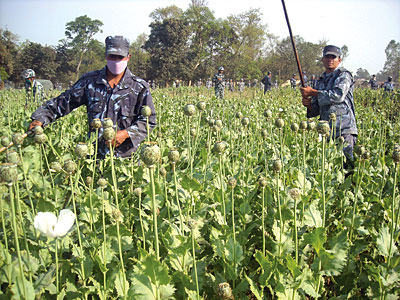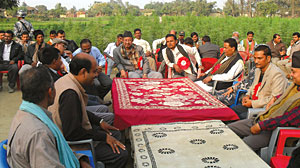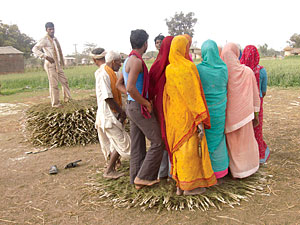 RAJU SHRESTHA POPPY FIELDS FOREVER: Police destroying an opium poppy field in Bishrampur of Parsa last month. Despite token action like this, opium and cannabis cultivation would not be possible without police and political protection. |
The parallels with Afghanistan are already frightening in the Nepal Tarai: criminality, impunity, the absence of the state, corruption and militancy. Acres upon acres of white poppy flowers now complete the picture.
Just as in Afghanistan, it is difficult to tell the difference between political militancy, criminality and terrorism. Police estimate that up to 2500 bighas (4175 acres) of farms in Bara and Parsa are growing poppies. That is enough to produce 30,000 kg of opium, which can be refined into 3.5 tons of heroin. Officials estimate that Nepal is now exporting nearly Rs 3 billion worth of opium.
Middlemen come to villages to pay IRs 65,000 for a kilo of opium, but if the farmer can take it across the border himself, the same amount can fetch IRs 80,000. "Why wouldn't I grow poppy if I can make up to Rs 100,000 per kathha (0.08 acres)?" asks Shahidullah Dewan. Opium has become such a lucrative cash crop that many farmers in the Tarai who were growing cannabis have switched to poppies.
Afghanistan today supplies 90 per cent of the world's opium. Travelling across the badlands of the Tarai these days, you find many of the same conditions as in Afghanistan: economic collapse, years of war, criminalisation of politics, poverty and joblessness. And just as the Taliban now source their income from opium, the Tarai's separatist militants could do the same. More ominously, poppy fields would find even more fertile political and climatic conditions in the midhills.
"It is clear that Nepal is not just a transit for the drug trade, but is emerging as a major producer," warns former police AIG, Keshab Baral.
Farmers in Parsa say the entire trade is conducted from across the border in Bihar. Indian wholesalers even send their own agricultural experts to advise farmers on farming methods. Indian middlemen pay out advances to Nepali farmers, and buy the entire crop even before it is harvested. They even promise security in case they are harassed by police. Bara's farmers are now so professional, they produce their own poppy seeds.
"This is exactly what happened in Afghanistan," explains police superintendent Devendra Subedi, who was an adviser for the UN in Afghanistan till 2007. "There is political instability, law and order have collapsed, there is no investment. We are on the same path."
India has huge tracts of government-supervised farms where it grows opium for medicinal purposes. But there is also a large underground trade in contraband opium for production of brown heroin meant for export. With Nepal emerging as a major producer of opium, it is only a matter of time before Indian heroin syndicates move their production to Nepal's lawless Tarai.
There is little doubt here that the open opium cultivation would not be possible without police and political protection. One local politician admits:
"A large proportion of the farmers rely on poppy cultivation, there is no way I can do politics here if I try to stop it."
Police involvement is nothing new. During the war, a police unit traveling to Bara's interior to collect protection money from the drug mafia was caught in a Maoist ambush, in 2005. Thirteen police were killed.
DOPE MATHS
1 bigha (1.67 acres) of ganja field
Cultivation cost: Rs 80,000
Protection money to police:
Rs 100,000
Income:
Rs 500,000 (if sold to middleman)
Rs 1,000,000 (if sold in India)
Ganja, too
Cannabis was always one of the major cash crops of Nepali farmers
 RAJU SHRESTHA |
When the Indian Embassy organised a function for the inauguration of a school it helped renovate in Auraha village recently, the dignitaries probably didn't realise that they were sitting next to a vast field of cannabis (pic, above).
District officials estimate that nearly 60 per cent of the cultivated land in Parsa district is under cannabis, a total of 15,000 bigha (25,050 acres). Opium is displacing a lot of the ganja fields of the Tarai, but the area under cannabis is still considerable and is not restricted to the Tarai. Makwanpur has become a major producer, and the hill districts of the mid and far west have traditionally been big ganja growers.
Former VDC chairman of Khairang in Makwanpur, Rajkumar Malla, says cannabis cultivation is open and was established in the past 15 years. Had it not been for this cash crop Makwanpur's subsistence farmers would have migrated for work because they can't feed themselves for even six months with their meagre harvests of millet and maize.
 SUNIL NEUPANE COLLECTIVISED: Farmers in Bishrampur in Parsa trample their cannabis harvest underfoot before selling it to Indian middlemen. |
Farmers now grow cannabis on every square inch of available land: in their kitchen gardens, in backyards and on the boundaries between terraces. Cannabis even grows next to schools, health posts and behind police stations.
The police are all in on it, and get Rs 400 per 12 kg packet of marijuana smuggled to India. In fact Makwanpur's marijuana is escorted by police in night convoys of up to 40 motorcycles each, right up to the border.
The only problem for farmers here is that a glut in the market has cut the price of marijuana by half.
Sunil Neupane in Parsa, Ramkumar Ailan in Hetauda, Shrawan Kumar Deb in Rajbiraj and Ajay Anuragi in Janakpur
READ ALSO:
Final betrayal - FROM ISSUE #496 (02 APRIL 2010 - 08 APRIL 2010)
Legacies of war - FROM ISSUE #496 (02 APRIL 2010 - 08 APRIL 2010)
Operation decontamination - FROM ISSUE #496 (02 APRIL 2010 - 08 APRIL 2010)


